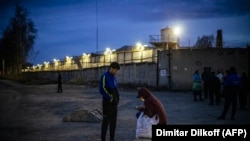In a BBC interview recorded on April 16 and broadcast on April 18, Russia’s ambassador to the U.K. Andrei Kelin answered questions about the political environment around Alexey Navalny, and his health while incarcerated.
Kelin denied any political motive behind a Moscow court’s decision in February that sentenced Navalny, a prominent Kremlin critic, to 2.5 years in prison.
“The European Court of Human Rights has ruled that the charges against him for money laundering, are, they say, arbitrary and unfair. Isn’t it true that he is in prison because he is a threat to President Putin for democratic reasons?” the BBC host, Andrew Marr asked.
“No, not at all. He has violated his terms of parole, and that is why he has given a sentence,” Kelin answered, reiterating Russia’s official position.
As Polygraph.info and others have reported, however, the Russian court ruled as a parole violation the time Navalny spent in Germany recovering from an alleged state-ordered poisoning with a military grade nerve agent.
In mid-March, Navalny said he was suffering from severe back pain and needed medical help, but the prison administration did not allow independent doctors to examine him. On March 31 Navalny said he was going on a hunger strike until given proper medical care.
On April 13, Navalny’s wife Yulia posted on Instagram that she was allowed to visit her husband but could only speak with him by phone with a glass wall between them. She said he was in a good mood but was at times too weak to hold the receiver and had to take breaks to put the phone and his head on the table and rest.
Answering the BBC’s questions about Navalny’s health, Kelin said: “Navalny will not be allowed to die in prison.” He then continued with series of false or misleading comments.
“Mr. Navalny is behaving like a hooligan, absolutely, in trying to violate every rule that has been established,” the Russian ambassador said. “His whole purpose is to attract attention. Today his left hand is sick, tomorrow his leg is sick and all that stuff.
“Navalny has been treated in the hospital, which lies not so far from the place where he is serving his sentence, and, as I understand he does not complain anymore about his pains.”
The claim that Navalny does “not complain anymore” is false.
According to a Reuters report on April 16 – the same day the BBC interview was recorded – Navalny’s health continued to “seriously deteriorate,” and the prison administration threatened to force feed him.
On April 17, Navalny’s physician Yaroslav Ashikhmin posted on Facebook a copy of what he said were the results of a blood test from April 15. Ashikhmin said the test revealed very high levels of potassium and creatinine, putting Navalny at risk of a heart attack and kidney failure. Ashikhmin added that Navalny “could die at any moment.”
On April 19, the Russian penitentiary system authority announced that Navalny, who is still on a hunger strike, had been transferred to a hospital in a prison near the city of Vladimir, about 120 miles east of Moscow. It said his condition was “satisfactory” and he had agreed to vitamin treatment.
Reuters reported that the prison hospital IK-3 where Navalny was transferred was built in 1964 to treat inmates suffering from drug and alcohol addiction. An inspection in March 2020 found that the hospital lacked necessary drugs and that equipment was in a “malfunctioning state.” The hospital treats convicts with tuberculosis and psychiatric disorders.
Navalny’s associates and supporters called for nationwide rallies to “save Navalny” on April 28, the same day Putin is scheduled to deliver his annual address to the nation. Russian authorities have warned citizens against joining the protests.
On April 19, Moscow City Court accepted a request from the Moscow prosecutor’s office to have three organizations associated with Navalny labeled as extremist. They are the Anti-Corruption Foundation (FBK), the Citizens’ Rights Protection Foundation, and Navalny’s regional headquarters.
The court order, posted on Twitter by Navalny’s team, said that the materials in the case have been classified as “state secrets” and would only be accessible to special lawyers.
Navalny’s FBK has continued publishing investigations during his time in prison. They include the video investigation “Putin’s Palace,” which was released on YouTube on January 19 and has been viewed over 116 million times. Another video investigation, “Secrets of Putin’s Valdai Dacha,” was published on April 15 and has been viewed more than 5 million times.
The United States and European countries have warned Russia of “consequences” if Navalny is not provided adequate medical treatment.





